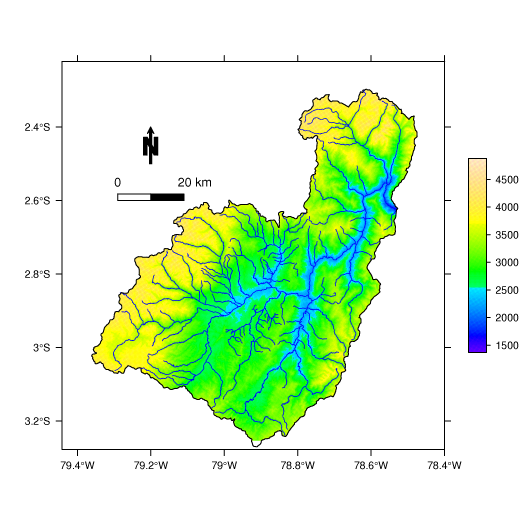Difference between revisions of "Plotting maps"
Jump to navigation
Jump to search
m |
|||
| Line 1: | Line 1: | ||
| + | [[Category:Projects]] | ||
| + | [[Category:Hydrology in R]] | ||
| + | |||
I decided to give up on plotting nice maps with [http://grass.itc.it grass]. The ps.map function is very powerful, but hard to remember for my not-so-frequent use. R has great plotting capabilities, and of course it does maps. It has an easy [http://cran.r-project.org/src/contrib/Descriptions/spgrass6.html grass interface]. What else do you want (importing other GIS formats? Try [http://cran.r-project.org/src/contrib/Descriptions/rgdal.html rgdal]). Plotting GIS data is very nicely implemented in the [http://cran.r-project.org/src/contrib/Descriptions/sp.html sp] package, part of the [http://r-spatial.sourceforge.net/ spatial data in R] project, but getting your plot the way you want is quite challenging. Here's what I came up with: | I decided to give up on plotting nice maps with [http://grass.itc.it grass]. The ps.map function is very powerful, but hard to remember for my not-so-frequent use. R has great plotting capabilities, and of course it does maps. It has an easy [http://cran.r-project.org/src/contrib/Descriptions/spgrass6.html grass interface]. What else do you want (importing other GIS formats? Try [http://cran.r-project.org/src/contrib/Descriptions/rgdal.html rgdal]). Plotting GIS data is very nicely implemented in the [http://cran.r-project.org/src/contrib/Descriptions/sp.html sp] package, part of the [http://r-spatial.sourceforge.net/ spatial data in R] project, but getting your plot the way you want is quite challenging. Here's what I came up with: | ||
Revision as of 10:02, 24 January 2008
I decided to give up on plotting nice maps with grass. The ps.map function is very powerful, but hard to remember for my not-so-frequent use. R has great plotting capabilities, and of course it does maps. It has an easy grass interface. What else do you want (importing other GIS formats? Try rgdal). Plotting GIS data is very nicely implemented in the sp package, part of the spatial data in R project, but getting your plot the way you want is quite challenging. Here's what I came up with:
library(spgrass6)
library(lattice)
paute <- rast.get6("paute_z")
colours <- topo.colors(1000) # if you want pretty topographic colours
colours <- gray(c(rep(100,10),100:15)/100) # for greyscale colours
trellis.par.set(sp.theme(regions=list(col = colours)))
scale = list("SpatialPolygonsRescale", layout.scale.bar(height=0.1), offset = c(690000,9735000), scale = 20000, fill=c("transparent","black"))
text1 = list("sp.text", c(690000,9740000), "0")
text2 = list("sp.text", c(710000,9740000), "20 km")
arrow = list("SpatialPolygonsRescale", layout.north.arrow(type=1), offset = c(698000,9720000), scale = 10000)
spplot(paute,draw = T, colorkey=list(space="right", height=0.5), cuts=127,
scales=list(draw=T), sp.layout=list(scale,text1,text2,arrow))
Good to know:
- cuts defines the number of colour intervals. The default is 15 and that's not really nice for continuous DEM images
- the colorkey options are part of levelplot {lattice} and are quite customizable
The result looks like this:
--Wbuytaert 17:53, 21 January 2008 (UTC)
